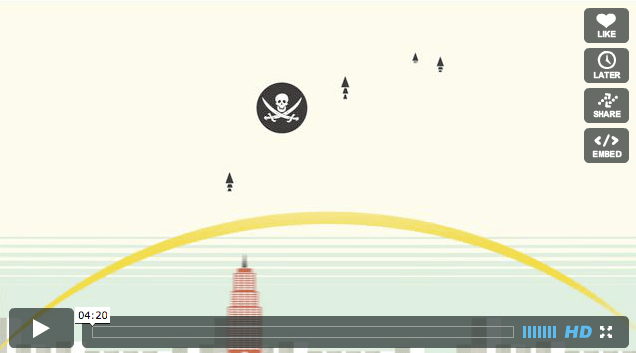
Einstein's blackboard.Credit: <a href="http://www.flickr.com/people/garrettc/">Garrett Coakley</a> via <a href="http://www.flickr.com/photos/garrettc/2172850095/">Flickr</a>.
The trigger for an Academic Spring that’s blossoming around the world is mathematician Timothy Gowers at the University of Cambridge, winner of the prestigious Fields medal, who wrote a blog post last month protesting Dutch publisher Elsevier’s business practices.
Elsevier publishes a mind-numbing number of journals, something approaching infinity.
Here are Gowers’ main objections, in his own words.
- [Elsevier] charges very high prices—so far above the average that it seems quite extraordinary that they can get away with it.
- One method that they have for getting away with it is a practice known as “bundling,” where instead of giving libraries the choice of which journals they want to subscribe to, they offer them the choice between a large collection of journals (chosen by them) or nothing at all. So if some Elsevier journals in the “bundle” are indispensable to a library, that library is forced to subscribe at very high subscription rates to a large number of journals, across all the sciences, many of which they do not want. (The journal Chaos, Solitons and Fractals is a notorious example of a journal that is regarded as a joke by many mathematicians, but which libraries all round the world must nevertheless subscribe to.) Given that libraries have limited budgets, this often means that they cannot subscribe to journals that they would much rather subscribe to, so it is not just libraries that are harmed, but other publishers, which is of course part of the motivation for the scheme.
- If libraries attempt to negotiate better deals, Elsevier is ruthless about cutting off access to all their journals.
Since then, others mathematician created the website thecostofknowledge.com in support of Gowers and against Elsevier. Thousands of academics joined the protest, 34 of whom published a more detailed manifesto explaining the reasons behind the boycott—including Elsevier’s support of the hotly-contested SOPA and PIPA anti-piracy bills in the US and the Research Works Act that aims to prevent government-funded researchers from being required to publish in open-access journals.
The powerhouse science journal Nature (not part of Elsevier) describes the likely impact of the Elsevier boycott:
Avoiding the company is unlikely to be problematic for mathematicians. “Elsevier doesn’t have any really strong journals in mathematics,” says Rob Kirby, a topologist at the University of California, Berkeley. But its biology and medicine journals include big-hitters such as Cell and The Lancet, so a boycott in those fields would be both a bigger blow to the company and a bigger sacrifice for the signatories. So far, around 900 people declaring themselves to be in biology or medicine have signed the pledge.
New Scientist (owned by the parent company of Elsevier) quotes Gowers as saying the protest is particularly popular with mathematicians because many no longer rely on journals to disseminate findings but instead freely share information online through blogs and wikis. The Polymath project allows mathematicians to solve proofs collaboratively online and was born from a 2009 blog post written by Gowers.
















